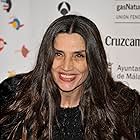Jara is an enigmatic young woman who has lived alone in the forest since childhood. One day she is discovered by Tato, a lonely and visceral young man. Between them arises a wild story of lo... Read allJara is an enigmatic young woman who has lived alone in the forest since childhood. One day she is discovered by Tato, a lonely and visceral young man. Between them arises a wild story of love and passion.Jara is an enigmatic young woman who has lived alone in the forest since childhood. One day she is discovered by Tato, a lonely and visceral young man. Between them arises a wild story of love and passion.
Photos
Ainara Gurrutxaga
- Alba
- (as Ainara)
- Director
- Writers
- All cast & crew
- Production, box office & more at IMDbPro
Storyline
Featured review
In the opening scenes of `Jara' we see a little girl with her father in their hut up in the hills with their sheep; at nightfall a band of thieves steal the flock and in so doing burn down their shack and kill her father. The girl takes to the hills eking out a living and becomes wild. We jump a number of years and catch up with her as a young woman still living in the wild.
One immediately thinks of `Nell' that very strange story so well enacted by Jodie Foster. But there are not really any parallels to the two stories. Whereas in `Nell' the story is carefully elaborated, in `Jara' the story rushes hurriedly through feverish love-making, scenes in the local brothel and police hunting down Tato, such that the viewer soon loses much interest in the matter. Which is a great pity: if the story had been developed much more slowly and carefully, giving greater detail of Jara's life in the hills and later her meeting with Tato, more depth could have been reached in the characteriology of the two principal characters, a greater compass of feelings could so easily have been portrayed. Even the love-scenes by the mountain brook are so hurried, almost as if the director was bent on getting past those torrid scenes as quickly as possible, such that he destroyed any possibility of expressing anything poetic or richly passionate - in the beautifully filmed scenes. The film continues headlong into its own failings; the last 30 minutes or so become dreadfully unspontaneous after such a promising start. The story just destroys itself in the making.
All right: so it gets very cold up in those sierras in the extreme north of the province of Cáceres, hardly the best way of shooting really breathtakingly beautiful amorous scenes and splashing into the brook tumbling down through the forest, I grant that.
Olivia Molina as Jara, in her first feature film for the cinema, was positively amazing; she captured wonderfully the personality of this wild young woman with an incredibly expressive sensuality; Sergio Peris-Mencheta as Tato was her perfect match. Absolutely no criticism can be made of this young couple, who, unfortunately, were not given more camera-time with which to develop the exquisite poeticness that the story should have offered the viewer. A great shame.
I sincerely suggest that they make the film again, forgetting about most of the last third of the film; with the same couple, please. But with much more sensitivity and better sequencing, more slowly, so as to be able to capture the full beauty of the couple's wild sensuality amidst the glory of mother nature; but being careful not to fall into the vulgarity of anything approaching pornography.
The film is beautifully photographed in some of the wildest and remotest sierras of Spain, in the famous valley of Jerte and in the heavily-wooded hills of Robledillo de Gata. Nearby are the natural parks of Candelario and Las Batuecas, and in Hervás, a small town with centuries of Sephardic history, there is one of the largest private collections of historical motor-cycles in the world. Also nearby is Las Hurdes, historically one of the most primitive parts of Europe. And not far away is the beautiful area known as La Vera which is definitely worth more than a visit.
It is a great pity that the film was not able to take more advantage of the natural setting, and, of course, the two leading actors. They were both deserving and worthy of a far better result.
One immediately thinks of `Nell' that very strange story so well enacted by Jodie Foster. But there are not really any parallels to the two stories. Whereas in `Nell' the story is carefully elaborated, in `Jara' the story rushes hurriedly through feverish love-making, scenes in the local brothel and police hunting down Tato, such that the viewer soon loses much interest in the matter. Which is a great pity: if the story had been developed much more slowly and carefully, giving greater detail of Jara's life in the hills and later her meeting with Tato, more depth could have been reached in the characteriology of the two principal characters, a greater compass of feelings could so easily have been portrayed. Even the love-scenes by the mountain brook are so hurried, almost as if the director was bent on getting past those torrid scenes as quickly as possible, such that he destroyed any possibility of expressing anything poetic or richly passionate - in the beautifully filmed scenes. The film continues headlong into its own failings; the last 30 minutes or so become dreadfully unspontaneous after such a promising start. The story just destroys itself in the making.
All right: so it gets very cold up in those sierras in the extreme north of the province of Cáceres, hardly the best way of shooting really breathtakingly beautiful amorous scenes and splashing into the brook tumbling down through the forest, I grant that.
Olivia Molina as Jara, in her first feature film for the cinema, was positively amazing; she captured wonderfully the personality of this wild young woman with an incredibly expressive sensuality; Sergio Peris-Mencheta as Tato was her perfect match. Absolutely no criticism can be made of this young couple, who, unfortunately, were not given more camera-time with which to develop the exquisite poeticness that the story should have offered the viewer. A great shame.
I sincerely suggest that they make the film again, forgetting about most of the last third of the film; with the same couple, please. But with much more sensitivity and better sequencing, more slowly, so as to be able to capture the full beauty of the couple's wild sensuality amidst the glory of mother nature; but being careful not to fall into the vulgarity of anything approaching pornography.
The film is beautifully photographed in some of the wildest and remotest sierras of Spain, in the famous valley of Jerte and in the heavily-wooded hills of Robledillo de Gata. Nearby are the natural parks of Candelario and Las Batuecas, and in Hervás, a small town with centuries of Sephardic history, there is one of the largest private collections of historical motor-cycles in the world. Also nearby is Las Hurdes, historically one of the most primitive parts of Europe. And not far away is the beautiful area known as La Vera which is definitely worth more than a visit.
It is a great pity that the film was not able to take more advantage of the natural setting, and, of course, the two leading actors. They were both deserving and worthy of a far better result.
- khatcher-2
- May 9, 2002
- Permalink
Details
- Release date
- Country of origin
- Language
- See more company credits at IMDbPro
- Color
Contribute to this page
Suggest an edit or add missing content










